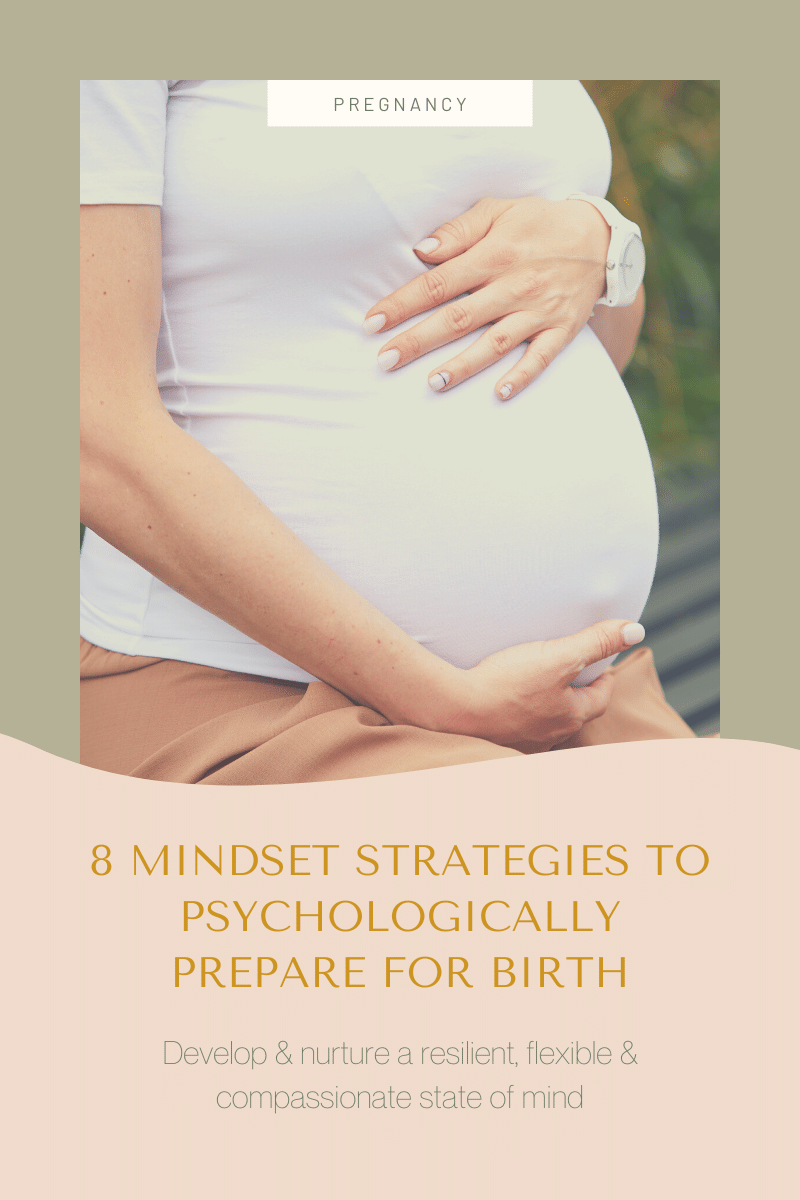8 Mindset Strategies to Psychologically Prepare for Birth
There’s a lot of talk about preparing yourself physically for birth, preparing your hospital bag and the baby’s nursery. But what about preparing yourself mentally? Your mindset plays a signifiant role in how you experience the labour and birth of your baby.
There are some simple things you can do to psychologically prepare yourself (as best as possible!). Doing so can help you feel more connected and content with your birthing experience. It will also reduce your vulnerability to developing postpartum difficulties, such as depression, anxiety, disappointment, guilt and shame.
You can read more about birth disappointment, it’s emotional impact and potential triggers here.
TEN WAYS TO NURTURE A RESILIENT BIRTH MINDSET
'When you change the way you view your birth, the way you birth will change.'
- Marie Mongan
01 | Source reliable, evidence based information
Be selective in the quality and quantity of information you gather regarding pregnancy, birth and parenthood. Choose only reliable sources or resources. In the UK, the NHS website is a good place to start.
02 | CONSIDER birth preferences RATHER THAN A BIRTH PLAN
Avoid making or writing down a rigid birth plan. Labour and birth are such unpredictable circumstances, the chances of a “plan” going as planned are slim. Instead, consider what your labour and birth preferences are, whilst keeping an intentional awareness that they may not always be possible.
03 | Consider your preferences for alL possible outcomes
Don’t limit yourself to thinking only about your preferred “type” of labour and birth. Be open to the possibility of all birth options and outcomes. Consider and share your preferences for every possible option. That way, whatever your birth story ends up being, you will feel more empowered and more in control of your experience.
04 | Set realistic expectations for your birth
Holding very high, unrealistic standards or perfectionist ideals potentially sets yourself up for disappointment, guilt and shame should things not go as hoped. Examine your expectations of labour and birth. Are they realistic? Consider what would be “good enough” for you and your birth experience. Make that your goal. If you exceed your expectations, great! That will be much less distressing than feeling as if you have “failed” in some way.
05 | Focus on the things you can control
Uncertainty breeds anxiety and fear. So rather than focus on the unpredictable, focus your attention on the things you can exert some control over. Mindfully attending to your breath during labour and birth can be a really helpful strategy. Try the Box Breathing exercise, or breathing techniques recommended by your midwife or doctor. You can read more about Box Breathing and it’s benefits here.
06 | Practice self-compassion
Be kind to yourself. Growing and birthing a baby is an amazing but very physically and emotionally challenging job! Practise & use self-compassionate affirmations during your pregnancy and labour. Regular self-compassion practice has been proven to increase motivation, boost happiness, improve body image, enhance self-worth, foster resilience and reduce vulnerability to mental health problems.
'Remember your words can plant gardens or burn whole forests down.'
- Gemma Troy
07 | Process your birth experience with someone WHO WILL validate yoU
Your feelings matter. They deserve a space to be heard. Talk about your birth experience, your thoughts and emotions resulting from it, with someone you trust to validate your feelings, not dismiss them. If you can’t identify anyone within your immediate support circle, consider speaking with a qualified health professional; someone who will non-judgementally hold space for you and your emotions, whatever they may be.
08 | Reflect on your wins, not just your losses
Whatever your birth story is, try to view it in its entirety. Sometimes, we view things through a filter, focussing on and magnifying the negative details of an event. Or the aspects which we perceive did not go “well”. We often ignore, discount or excuse positive aspects. This is why talking through your birth experience, when you feel ready to do so, can be very helpful. It may help you to see things from a different perspective and possibly notice things you’d previously missed or overlooked.
WANT TO READ MORE PREGNANCY & MOTHERHOOD ARTICLES?
If you found this useful, you may also like to read:
For more clinical psychology strategies and resources, sign up to my fortnightly newsletter, Unfrazzled, your go-to source for refuge in the chaos. Each edition curates a blend of psychological insights, practical tips, and inspiration to help you untangle the knots of modern life ⋒

